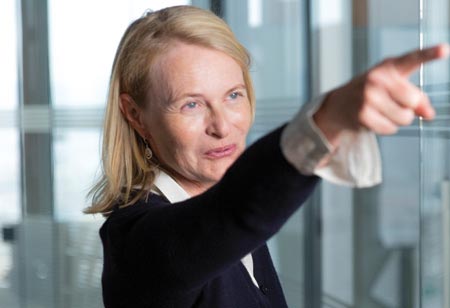The message is clear for anyone who cares to listen: “The pace of change has never been this fast yet will never be this slow again!” (Justin Trudeau, 2018). The exponential growth of technological possibilities versus the logarithmic development of large organizations is a huge challenge for stagnating and traditional industries such as banking and insurance.
A recurring theme I observed while driving transformation and building state-of-the-art digital solutions for the past 20 plus years in the financial services industry is that technology – even the best and most innovative – always acts as a (powerful) enabler but is not the driver of real transformation and that change based solely on technology only takes you so far.
Now, as the Chief Digital Officer at UNIQA Insurance Group, one of the major players in the insurance industry in Austria & CEE, I have the mission to develop and execute a digital strategy, and in 2016 led the effort to completely transform and digitalize the way we do business in order to stay relevant in the digital world.
In the summer of 2016, we launched a new Digital Team within the existing organizational structures, endowing them with excellent talent, enough resources, and the guidance of our Group CEO and the Head of Group IT.
There were two options for how to move forward with this new Digital Team:
• Placing the team outside of the traditional business and aim to develop innovative services very quickly, adding new digital products and services as an additional stream of income to the existing business model, or
• Transform and reinvent the business from within.
The advantage of driving digitalization from the inside was that UNIQA was able to develop in all digital dimensions:
• Customer Centricity: Understanding customer needs and being able to address their changing and growing demands–a crucial factor for sustainable revenue growth and acquiring new customers
• Automation: Achieving simpler, cost-efficient, and high-quality processes by providing much greater levels of integration, transparency, and IT/business collaboration
• Corporate Culture: Empowering employees through new ways of working, fostering a new team spirit and collaboration. Working in cross-functional and autonomous teams was vital to break up silos
• Innovation: Fulfilling innovation challenges in a large organization by encouraging a ‘start-up’ mentality
The starting point was to deliver an exceptional customer experience that satisfies and even exceeds customer needs through the development of digital touchpoints. We placed the interaction with our customers at the heart of our customer-facing applications. Our online touch points – the myUNIQA app and customer portal – are constantly tailored to the needs of the users.
"For us, a deep-rooted cultural change from within the company, altering how we collaborate as employees and communicate with customers, was able to transform and reinvent the business sustainably"
Our goal was to digitalize and simplify the most important customer journeys and significantly enhance our business agility. Starting with the top management these new ways of working were spread out through the organization.
The major challenge we had to face after the strict lockdowns were how to define “new normal” ways of working. How can we apply what we have learned throughout the lockdowns and the pandemic to a new hybrid set-up throughout the organization, to further ensure agility, high job satisfaction, and productivity?
We started with UNIQA’s guiding principles “Customer first, Simplicity, Responsibility, Integrity, and Community”. They are the key values for the successful transformation and essential to prepare the company culture for the new scaling of “hybrid” working.
When choosing the right set-up for meetings and desired mode of collaboration, we found that creative or idea-finding processes, involving a lot of discussions, are best done in a physical set-up. In contrast, meetings, where active interactions between team members are limited or standardized processes, are prevailing, a hybrid set-up can combine the benefits of meaningful in-person conversation with the organizational flexibility of remote meetings.
However, an absolute precondition to having this choice is enabling digital collaboration tools. A company-wide rollout of tools like MS Teams for communication and SharePoint to facilitate remote work environments is essential. Following this, our remote team members were able to collaborate with on-site teams on shared documents or visualize input on the whiteboard feature, projecting said input on large screens in a meeting room. Regarding the suitable hardware, among other things, we are currently experimenting in training set-ups with 360° cameras, which display the entire room with all participants.
We find the most significant point of leverage to enable the productive use of the hybrid set-up is the training of the team members. Especially our engaged agile coaches and HR employees are the important facilitators of this transformation. Thus, they systematically train, facilitate, and encourage UNIQA employees regarding in general the different important aspects of the new way of working in our agile, digital landscape and as one of the aspects of new hybrid set-ups.
In conclusion, technology alone is not sufficient to deliver the benefits of digitization to a company. For the UNIQA Insurance Group, a deep-rooted cultural change from within the company, altering how we collaborate as employees and communicate with customers, was able to transform and reinvent the business sustainably. Even in the aftermath, the organization now benefits from those sustainable changes, pathing the way for the “new normal” hybrid working. By fostering the digital mindset as well as enabling the right set-up, method, and technology we will continue to strengthen our culture from within to face the next challenges to come.
We are proud to contribute to UNIQA´s ability to successfully deal with and stay relevant in these rapidly changing environments.












